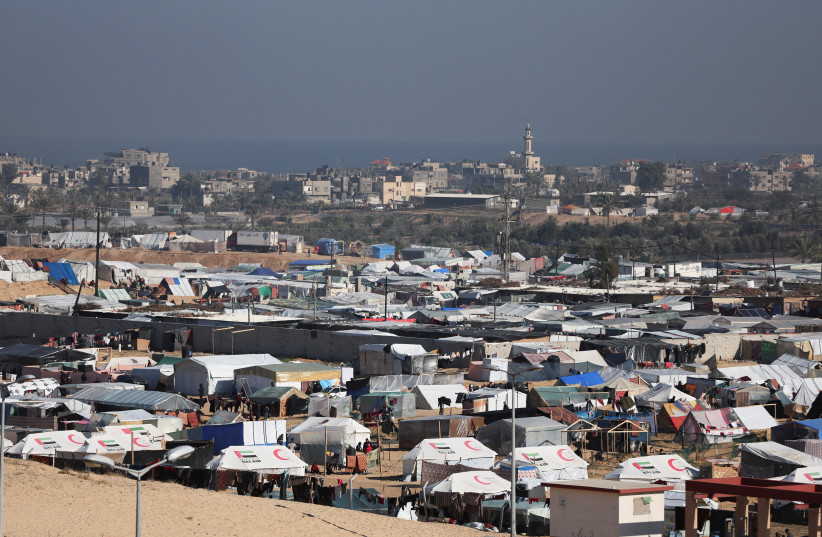Hamas has set a trap in Rafah for the IDF.
Despite reports that the military has an updated operational plan for entering Rafah in the southern Gaza Strip, or for at least securing the Egypt/Gaza border, known as the Philadelphi Corridor, there is, at the current time, no immediate decision to move forward.
So, why hasn’t the IDF gone into Rafah to date? The reasons evolved, but paradoxically, there are even more problems today with an operation, but it is also more critical than ever.
Initially, the IDF decided to mostly focus its initial invasion on northern Gaza, leaving not only Rafah but also most of Khan Yunis and the rest of southern Gaza untouched.
The hope – or gamble – was that Hamas’s leadership would see the dominance, power, and destruction in northern Gaza and make the call to cut a deal favorable to Israel to avoid the same fate for Khan Yunis.

The IDF also wanted to give as wide an area as possible for northern Gaza’s 1.4 million Palestinian civilians to evacuate to the entire area of southern Gaza.
When Hamas broke the hostage deal in early December, the IDF decided to go after Khan Yunis, moving most of the Palestinian civilians in Khan Yunis even further south – to Rafah. Again, the civilians needed somewhere to go after Israel’s strikes made living there impossible.
But an additional reason the IDF did not want to attack Rafah was that it borders Egypt.
Publicly, Egypt has been highly critical of Israel’s war in Gaza. Yet at the same time, Cairo is a crucial part of negotiations for the hostages and will be essential to the day-after plans for rule in Gaza.
This means that Jerusalem cannot afford to alienate Egypt over tensions regarding its actions in Rafah and the Philadelphi Corridor.
Without Egyptian support, the likelihood of a hostage deal drops dramatically, while the likelihood that Israel gets stuck owning and running Gaza against its will rises dramatically.
Egypt not only wants to avoid border clashes, it wants to prevent even the possibility of a rush of thousands of Palestinians from Gaza into Egyptian territory.
The Egyptians also do not want to be accused of facilitating and endorsing Israeli control of Gaza, which could lead to them being seen as traitors to the Palestinians.
All of this means that the IDF cannot take significant action in Rafah, or take control of the Philadelphi Corridor, without very careful negotiations with Cairo.
And this was always a problem, as it meant that Rafah could serve as a sanctuary for firing rockets on Israel even as the IDF started to reduce Hamas’s ability to fire rockets from northern Gaza, central Gaza, and Khan Yunis.
But as long as Israel was more confident that Hamas’s leaders and Israeli hostages were in Khan Yunis, there were months to play with in December and January to try to end the war by surrounding the Hamas leadership in its southern capital.
As time has dragged on, with no sign of catching Hamas’s leadership in Khan Yunis after seven weeks of trying, there are greater suspicions that aspects of Hamas’s leadership could be in Rafah, something which was always a concern.
If this is true, Israel may not even have started putting the immediate close-up pressure on Hamas’s leadership necessary to topple it and get a favorable deal for the hostages.
In other words, if Hamas’s leadership is not considering a deal until the IDF is close enough to “knock on its door” – and if some of them are in Rafah, which has gone mostly untouched – then all of the power and pressure thrown at Khan Yunis will not achieve a decisive turning point any more than taking control of northern Gaza did.
Will Hamas fold?
There are top defense officials who believe now that Rafah’s population has shot up from around 200,000 to over a million, the suffering and poverty of the population will pressure Hamas into folding.
But why would the religiously fanatical Hamas leadership care more about “mere” starvation and poverty for its population when it has not blinked from around 24,000 of them dying, including at least 9,000 of its fighters?
Many observers believe the opposite is true: that Hamas is cynically thrilled when its population is in desperate straits, because this wins more global sympathy and brings more pressure on Israel to end the war.
So let’s say Israel finally realizes it needs to act in Rafah, or at least secure the Philadelphi Corridor to prevent Hamas from escaping and stop a smuggling and rearming process.
To do that, the government will need to: a) end its delay and decide what day-after policy it will pursue, since Egypt will not cooperate without a satisfactory long-term vision; 2) figure out how to act without killing Palestinian civilians within the most crowded Gaza situation it has yet confronted, with little evacuation options; and c) decide what it will do if and when it finds any of Hamas’s leadership surrounded by hostages.
This is the trap that Hamas has set for the IDF.
The military did show a stunning ability to walk a tightrope and escape another trap when it took control of Hamas’s Shifa Hospital command center – without firing a shot indoors.
To achieve any of its stated goals, the IDF and Israel will likely need to spring this trap as well and navigate a way through.
